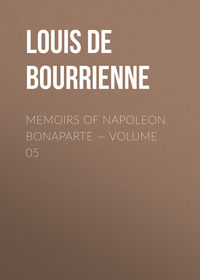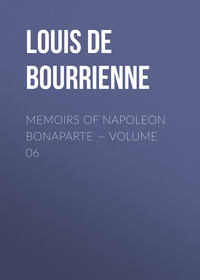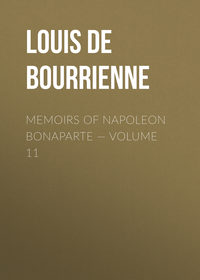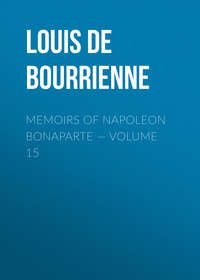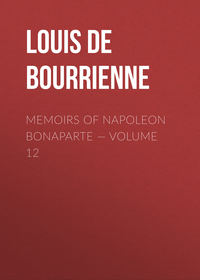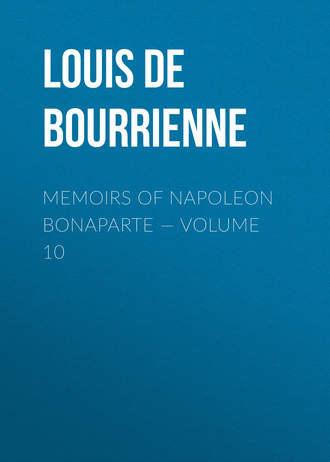 полная версия
полная версияMemoirs of Napoleon Bonaparte — Volume 10
Dupas was as much execrated in the Hanse Towns as Clarke had been in Berlin when he was governor of that capital during the campaign of 1807. Clarke had burdened the people of Berlin with every kind of oppression and exaction. He, as well as many others, manifested a ready obedience in executing the Imperial orders, however tyrannical they might be; and Heaven knows what epithets invariably accompanied the name of Clarke when pronounced by the lips of a Prussian.
Dupas seemed to have taken Clarke as his model. An artillery officer, who was in Hamburg at the time of the disturbance I have just mentioned, told me that it was he who was directed to place two pieces of light- artillery before the gate of Altona. Having executed this order, he went to General Dupas, whom he found in a furious fit of passion, breaking and destroying everything within his reach. In the presence of the officer he broke more than two dozen plates which were on the table before him: these plates, of course, had cost him very little!
On the day after the disturbance which had so fatal a termination I wrote to inform the Prince of Porte-Corvo of what had taken place; and in my letter I solicited the suppression of an extraordinary tribunal which had been created by General Dupas. He returned me an immediate answer, complying with my request. His letter was as follows:
I have received your letter, my dear Minister: it forcibly conveys the expression of your right feeling, which revolts against oppression, severity, and the abase of power. I entirely concur in your view of the subject, and I am distressed whenever I see such acts of injustice committed. On an examination of the events which took place on the 19th it is impossible to deny that the officer who ordered the gates to be closed so soon was in the wrong; and next, it may be asked, why were not the gates opened instead of the, military being ordered to fire on the people? But, on the other hand, did not the people evince decided obstinacy and insubordination? were they not to blame in throwing stones at the guard, forcing the palisades, and even refusing to listen to the voice of the magistrates? It is melancholy that they should have fallen into these excesses, from which, doubtless, they would have refrained had they listened to the civil chiefs, who ought to be their first directors. Finally, my dear Minister, the Senator who distributed money at the gate of Altona to appease the multitude would have done better had he advised them to wait patiently until the gates were opened; and he might, I think, have gone to the Commandant or the General to solicit that concession.
Whenever an irritated mob resorts to violence there is no safety for any one. The protecting power mast then exert its utmost authority to stop mischief. The Senate of ancient Rome, so jealous of its prerogatives, assigned to a Dictator, in times of trouble, the power of life and death, and that magistrate knew no other code than his own will and the axe of his lictors. The ordinary laws did not resume their course until the people returned to submission.
The event which took place in Hamburg produced a feeling of agitation of which evil-disposed persons might take advantage to stir up open insurrection. That feeling could only be repressed by a severe tribunal, which, however, is no longer necessary. General Dupas has, accordingly, received orders to dissolve it, and justice will resume her usual course. J. BERNADOTTE DENSEL, 4th May, 1808.
When Bernadotte returned to Hamburg he sent. Dupas to Lubeck. That city, which was poorer than Hamburg, suffered cruelly from the visitation of such a guest.
Dupas levied all his exactions in kind, and indignantly spurned every offer of accepting money, the very idea of which, he said, shocked his delicacy of feeling. But his demands became so extravagant that the city of Lubeck was utterly unable to satisfy them. Besides his table, which was provided in the same style of profusion as at Hamburg, he required to be furnished with plate, linen, wood, and candles; in short, with the most trivial articles of household consumption.
The Senate deputed to the incorruptible General Dupas M. Nolting, a venerable old man, who mildly represented to him the abuses which were everywhere committed in his name, and entreated that he would vouchsafe to accept twenty Louis a day to defray the expenses of his table alone. At this proposition General Dupes flew into a rage. To offer him money was an insult not to be endured! He furiously drove the terrified Senator out of the house, and at once ordered his 'aide de camp' Barrel to imprison him. M. de Barrel, startled at this extraordinary order, ventured to remonstrate with the General, but in vain; and, though against his heart, he was obliged to obey. The aide de camp accordingly waited upon the Senator Notting, and overcome by that feeling of respect which gray hairs involuntarily inspire in youth, instead of arresting him, he besought the old man not to leave his house until he should prevail on the General to retract his orders. It was not till the following day that M. de Barrel succeeded in getting these orders revoked—that is to say, he obtained M. Notting's release from confinement; for Dupas would not be satisfied until he heard that the Senator had suffered at least the commencement of the punishment to which his capricious fury had doomed him.
In spite of his parade of disinterestedness General Dupas yielded so far as to accept the twenty Louis a day for the expense of his table which M. Notting had offered him on the part of the Senate of Lubeck; but it was not without murmurings, complaints, and menaces that he made this generous concession; and he exclaimed more than once, "These fellows have portioned out my allowance for me." Lubeck was not released from the presence of General Dupes until the month of March 1809, when he was summoned to command a division in the Emperor's new campaign against Austria. Strange as it may appear, it is nevertheless the fact, that, oppressive as had been his presence at Lubeck, the Hanse Towns soon had reason to regret him.
CHAPTER XV
1808.
Promulgation of the Code of Commerce—Conquests by Status-consulte— Three events in one day—Recollections—Application of a line of Voltaire—Creation of the Imperial nobility—Restoration of the university—Aggrandisement of the kingdom of Italy at the expense of Rome—Cardinal Caprara'a departure from Paris—The interview at Erfurt.
The year 1808 was fertile in remarkable events. Occupied as I was with my own duties, I yet employed my leisure hours in observing the course of those great acts by which Bonaparte seemed determined to mark every day of his life. At the commencement of 1808 I received one of the first copies of the Code of Commerce, promulgated on the 1st of January by the Emperor's order. This code appeared to me an act of mockery; at least it was extraordinary to publish a code respecting a subject which it was the effect of all the Imperial decrees to destroy. What trade could possibly exist under the Continental system, and the ruinous severity of the customs? The line was already extended widely enough when, by a 'Senatus-consulte', it was still further widened. The Emperor, to whom all the Continent submitted, had recourse to no other formality for the purpose of annexing to the Empire the towns of Kehl, Cassel near Mayence, Wesel, and Flushing, with the territories depending on them.
—[A resolution of the senate, or a "Senatus-consulte" was the means invented by Napoleon for altering the imperial Constitutions, and even the extent of the Empire. By one of these, dated 21st January 1808, the towns of Kehl, Cassel, and Wesel, with Flushing, all already seized, were definitely united to France. The loss of Wesel, which belonged to Murat's Grand Duchy of Berg, was a very sore point with Murat.]—
These conquests, gained by decrees and senatorial decisions, had at least the advantage of being effected without bloodshed. All these things were carefully communicated to me by the Ministers with whom I corresponded, for my situation at Hamburg had acquired such importance that it was necessary I should know everything.
At this period I observed among the news which I received from different places a singular coincidence of dates, worthy of being noted by the authors of ephemrides. On the same day-namely, the 1st of February Paris, Lisbon, and Rome were the scenes of events of different kinds, but, as they all happened on one day, affording a striking example of the rapidity of movement which marked the reign of Bonaparte. At Paris the niece of Josephine, Mademoiselle de Tascher, whom Napoleon had lately exalted to the rank of Princess, was married to the reigning Prince of Ahremberg, while at the same time Junot declared to Portugal that the house of Braganza had ceased to reign, and French troops were, under the command of General Miollis, occupying Rome. This occupation was the commencement of prolonged struggles, during which Pins VII. expiated the condescension he had shown in going to Paris to crown Napoleon.
Looking over my notes, I see it was the day after these three events occurred that Bonaparte gave to his brother-in-law, Prince Borghese, the Governorship-General of the departments beyond the Alps which he had just founded; and of which he made the eighth Grand Dignitary of the Empire. General Menou, whom I had not seen since Egypt, was obliged by this appointment to leave Turin, where he had always remained. Bonaparte, not wishing to permit him to come to Paris, sent Menou to preside over the Junta of Tuscany, of which he soon afterwards made another General- Governorship, which he entrusted to the care of his sister Elisa.
—[Prince Camille Philippe Louis Borghese (1755-1832), an Italian, had married, 6th November 1808, Pauline Bonaparte, the sister of Napoleon, and the widow of General Leclerc. He had been made Prince and Duke of Guastalla when that duchy was given to his wife, 30th Marsh 1806. He separated from his wife after a few years. Indeed Pauline was impossible as a wife if half of the stories about her are true. It was she who, finding that a lady was surprised at her having sat naked while a statue of her was being modelled for Canova, believed she had satisfactorily explained matters by saying, "but there was a fire in the room."]—
My correspondence relative to what passed in the south of France and of Europe presented to me, if I may so express myself, merely an anecdotal interest. Not so the news which came from the north. At Hamburg I was like the sentinel of an advanced post, always on the alert. I frequently informed the Government of what would take place before the event actually happened. I was one of the first to hear of the plans of Russia relative to Sweden. The courier whom I sent to Paris arrived there at the very moment when Russia made the declaration of war. About the end of February the Russian troops entered Swedish Finland, and occupied also the capital of that province, which had at all times been coveted by the Russian Government. It has been said that at the interview at Erfurt Bonaparte consented to the usurpation of that province by Alexander in return for the complaisance of the latter in acknowledging Joseph as King of Spain and the Indies.
The removal of Joseph from the throne of Naples to the throne of Madrid belongs, indeed, to that period respecting which I am now throwing together a few recollections. Murat had succeeded Joseph at Naples, and this accession of the brother-in-law of Napoleon to one of the thrones of the House of Bourbon gave Bonaparte another junior in the college of kings, of which he would have infallibly become the senior if he had gone on as he began.
I will relate a little circumstance which now occurs to me respecting the kings manufactured by Napoleon. I recollect that during the King of Etruria's stay in Paris—the First Consul went with that Prince to the Comedie Francaise, where Voltaire's 'OEdipus' was performed. This piece, I may observe, Bonaparte liked better than anything Voltaire ever wrote. I was in the theatre, but not in the First Consul's box, and I observed, as all present must have done, the eagerness with which the audience applied to Napoleon and the King of Etruria the line in which Philoctetes says—
"J'ai fait des souverains et n'ai pas voulu l'etre."
["I have made sovereigns, but have not wished to be one myself."]
The application was so marked that it could not fail to become the subject of conversation between the First Consul and me. "You remarked it, Bourrienne?" . . . "Yes, General." . . "The fools! . . . They shall see! They shall see! "We did indeed see. Not content with making kings, Bonaparte, when his brow was encircled by a double crown, after creating princes at length realised the object he had long contemplated, namely, to found a new nobility endowed with hereditary rights. It was at the commencement of March 1808 that he accomplished this project; and I saw in the 'Moniteur' a long list of princes, dukes, counts, barons, and knights of the Empire; there were wanting only viscounts and marquises.
At the same time that Bonaparte was founding a new nobility he determined to raise up the old edifice of the university, but on a new foundation. The education of youth had always been one of his ruling ideas, and I had an opportunity of observing how he was changed by the exercise of sovereign power when I received at Hamburg the statutes of the new elder daughter of the Emperor of the French, and compared them with the ideas which Bonaparte, when General and First Consul, had often expressed to me respecting the education which ought to be given youth. Though the sworn enemy of everything like liberty, Bonaparte had at first conceived a vast system of education, comprising above all the study of history, and those positive sciences, such as geology and astronomy, which give the utmost degree of development to the human mind. The Sovereign, however, shrunk from the first ideas of the man of genius, and his university, confided to the elegant suppleness of M. de Fontaines, was merely a school capable of producing educated subjects but not enlightened men.
Before taking complete possession of Rome, and making it the second city of the Empire, the vaunted moderation of Bonaparte was confined to dismembering from it the legations of Ancona, Urbino, Macerata, and Camerino, which were divided into three departments; and added to the Kingdom of Italy. The patience of the Holy See could no longer hold out against this act of violence, and Cardinal Caprara, who had remained in Paris since the coronation, at last left that capital. Shortly afterwards the Grand Duchies of Parma and Piacenza were united to the French Empire, and annexed to the government of the departments beyond the Alps. These transactions were coincident with the events in Spain and Bayonne before mentioned.
After the snare laid at Bayonne the Emperor entered Paris on the 14th of August, the eve of his birthday. Scarcely had he arrived in the capital when he experienced fresh anxiety in consequence of the conduct of Russia, which, as I have stated, had declared open war with Sweden, and did not conceal the intention of seizing Finland. But Bonaparte, desirous of actively carrying on the war in Spain, felt the necessity of removing his troops from Prussia to the Pyrenees. He then hastened the interview at Erfurt, where the two Emperors of France and Russia had agreed to meet. He hoped that this interview would insure the tranquillity of the Continent, while he should complete the subjection of Spain to the sceptre of Joseph. That Prince had been proclaimed on the 8th of June; and on the 21st of the same month he made his entry into Madrid, but having received, ten days after, information of the disaster at Baylen, he was obliged to leave the Spanish capital.
—[The important battle of Daylen, where the French, under General Dupont, were beaten by the Spaniards, was fought on the 19th of July 1808.]—
Bonaparte's wishes must at this time have been limited to the tranquillity of the Continent, for the struggle between him and England was more desperate than ever. England had just sent troops to Portugal under the command of Sir Arthur Wellesley. There was no longer any hope of a reconciliation with Great Britain: The interview at Erfurt having been determined on, the Emperor, who had returned from Bayonne to Paris, again left the capital about the end of September, and arrived at Metz without stopping, except for the purpose of reviewing the regiments which were echeloned on his route, and which were on their march from the Grand Army to Spain.
I had heard some time previously of the interview which was about to take place, and which was so memorable in the life of Napoleon. It excited so much interest in Germany that the roads were covered with the equipages of the Princes who were going to Erfurt to witness the meeting. The French Emperor arrived there before Alexander, and went forward three leagues to meet him. Napoleon was on horseback, Alexander in a carriage. They embraced, it is said, in a manner expressive of the most cordial friendship. This interview was witnessed by most of the sovereign Princes of Germany. However, neither the King of Prussia nor the Emperor of Austria was present. The latter sovereign sent a letter to Napoleon, of which I obtained a copy. It was as follows:
SIRE, MY BROTHER,—My Ambassador in Paris informs me that your Majesty is about to proceed to Erfurt to meet the Emperor Alexander. I eagerly seize the opportunity of your approach to my frontier to renew those testimonials of friendship and esteem which I have pledged to you; and I send my Lieutenant-General, Baron Vincent, to convey to you the assurance of my unalterable sentiments. If the false accounts that have been circulated respecting the internal institutions which I have established in my monarchy should for a moment have excited your Majesty's doubts as to my intentions, I fatter myself that the explanations given on that subject by Count Metternich to your Minister will have entirely removed them. Baron Vincent is enabled to confirm to your Majesty all that has been said by Count Metternich on the subject, and to add any further explanations, you may wish for. I beg that your Majesty will grant him the same gracious reception he experienced at Paris and at Warsaw. The renewed marks of favour you may bestow on him will be an unequivocal pledge of the reciprocity of your sentiments, and will seal that confidence which will render our satisfaction mutual.
Deign to accept the assurance of the unalterable affection and respect with which I am, Sire, my Brother, Your imperial and royal Majesty's faithful brother and friend,
(Signed) FRANCIS.PRESBURG, 8th September 1808.
This letter appears to be a model of ambiguity, by which it is impossible Napoleon could have been imposed upon. However, as yet he had no suspicion of the hostility of Austria, which speedily became manifest; his grand object then was the Spanish business, and, as I have before observed, one of the secrets of Napoleon's genius was, that he did not apply himself to more than one thing at a time.
At Erfurt Bonaparte attained the principal object he had promised himself by the meeting. Alexander recognized Joseph in his new character of King of Spain and the Indies. It has been said that as the price of this recognition Napoleon consented that Alexander should have Swedish Finland; but for the truth of this I cannot vouch. However, I remember that when, after the interview at Erfurt, Alexander had given-orders to his ambassador to Charles IV. to continue his functions under King Joseph, the Swedish charge d'affaires at Hamburg told me that confidential letters received by him from Erfurt led him to fear that the Emperor Alexander had communicated to Napoleon his designs on Finland, and that Napoleon had given his consent to the occupation. Be this as it may, as soon as the interview was over Napoleon returned to Paris, where he presided with much splendour at the opening of the Legislative Body, and set out in the month of November for Spain.
CHAPTER XVI
1808.
The Spanish troops in Hamburg—Romana's siesta—His departure for Funen—Celebration of Napoleon's birthday—Romana's defection— English agents and the Dutch troops—Facility of communication between England and the Continent—Delay of couriers from Russia— Alarm and complaints—The people of Hamburg—Montesquieu and the Minister of the Grand Duke of Tuscany—Invitations at six months— Napoleon's journey to Italy—Adoption of Eugene—Lucien's daughter and the Prince of the Asturias—M. Auguste de Stael's interview with Napoleon.
Previous to the interview at Erfurt an event took place which created a strong interest in Hamburg and throughout Europe, an event which was planned and executed with inconceivable secrecy. I allude to the defection of the Marquis de la Romans, which I have not hitherto noticed, in order that I might not separate the different facts which came to my knowledge respecting that defection and the circumstances which accompanied it.
The Marquis de la Romans had come to the Hanse Towns at the head of an army corps of 18,000 men, which the Emperor in the preceding campaign claimed in virtue of treaties previously concluded with the Spanish Government. The Spanish troops at first met with a good reception in the Hanse Towns. The difference of language, indeed, occasionally caused discord, but when better acquainted the inhabitants and their visitors became good friends. The Marquis de la Romans was a little swarthy man, of unprepossessing and rather common appearance; but he had a considerable share of talent and information. He had travelled in almost every part of Europe, and as he had been a close observer of all he saw his conversation was exceedingly agreeable and instructive.
During his stay at Hamburg General Romans spent almost every evening at my house, and invariably fell asleep over a game at whist. Madame de Bourrienne was usually his partner, and I recollect he perpetually offered apologies for his involuntary breach of good manners. This, however, did not hinder him from being guilty of the same offence the next evening. I will presently explain the cause of this regular siesta.
On the King of Spain's birthday the Marquis de la Romans gave a magnificent entertainment. The decorations of the ballroom consisted of military emblems. The Marquis did the honours with infinite grace, and paid particular attention to the French generals. He always spoke of the Emperor in very respectful terms, without any appearance of affectation, so that it was impossible to suspect him of harbouring disaffection. He played his part to the last with the utmost address. At Hamburg we had already received intelligence of the fatal result of the battle of the Sierra Morena, and of the capitulation of Dupont, which disgraced him at the very moment when the whole army marked him out as the man most likely next to receive the baton of Marshal of France.
Meanwhile the Marquis de la Romans departed for the Danish island of Funen, in compliance with the order which Marshal Bernadotte had transmitted to him. There, as at Hamburg, the Spaniards were well liked, for their general obliged them to observe the strictest discipline. Great preparations were made in Hamburg on the approach of Saint Napoleon's day, which was then celebrated with much solemnity in every town in which France had representatives. The Prince de Ponte-Corvo was at Travemunde, a small seaport near Lubeck, but that did not prevent him from giving directions for the festival of the 15th of August. The Marquis de la Romana, the better to deceive the Marshal, despatched a courier, requesting permission to visit Hamburg on the day of the fete in order to join his prayers to those of the French, and to receive, on the day of the fete, from the hands of the Prince, the grand order of the Legion of Honour, which he had solicited, and which Napoleon had granted him. Three days after Bernadotte received intelligence of the defection of de la Romana. The Marquis had contrived to assemble a great number of English vessels on the coast, and to escape with all his troops except a depot of 600 men left at Altona. We afterwards heard that he experienced no interruption on his passage, and that he landed with his troops at Corunna. I now knew to what to attribute the drowsiness which always overcame the Marquis de la Romana when he sat down to take a hand at whist. The fact was, he sat up all night making preparations for the escape which he had long meditated, while to lull suspicion he showed himself everywhere during the day, as usual.



